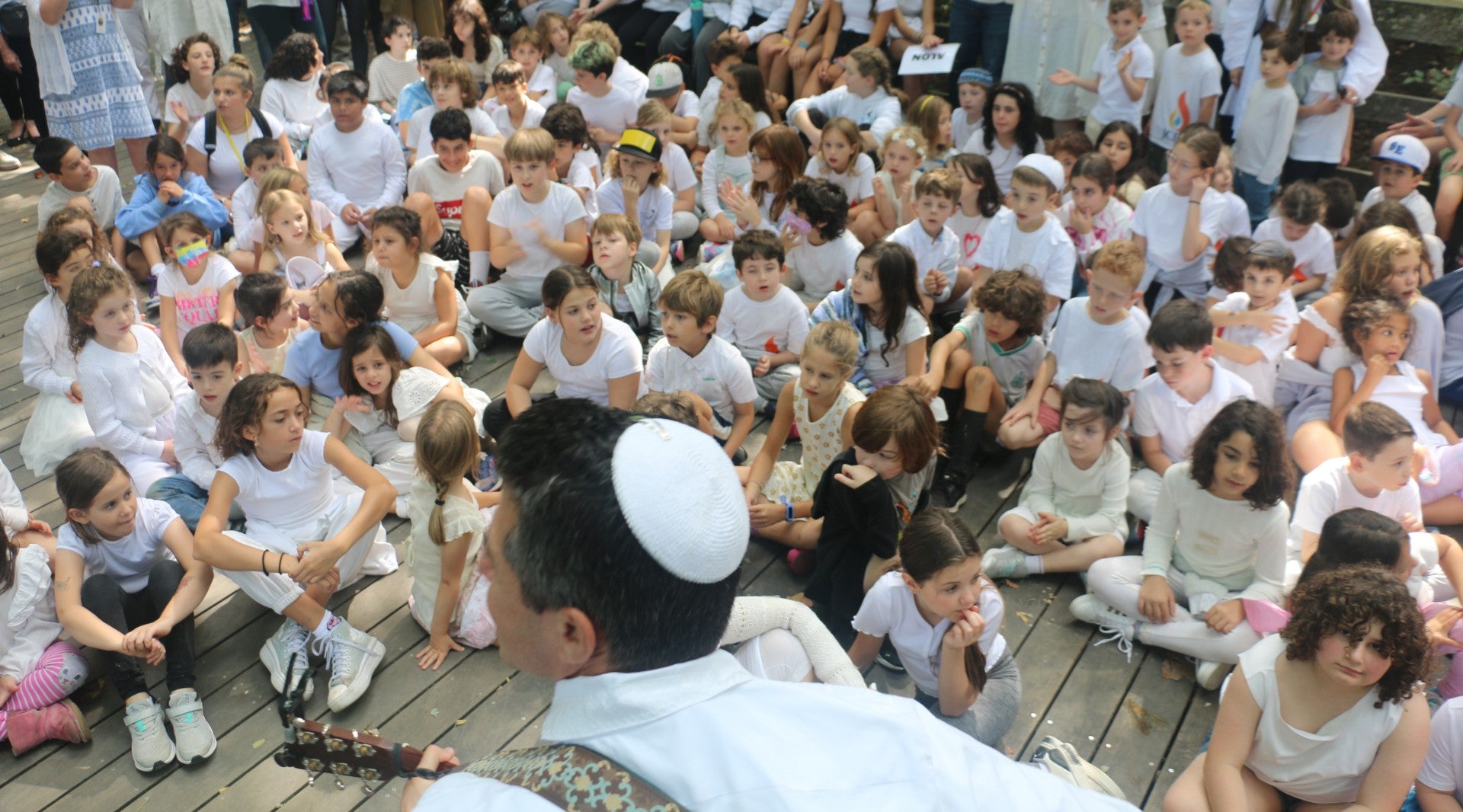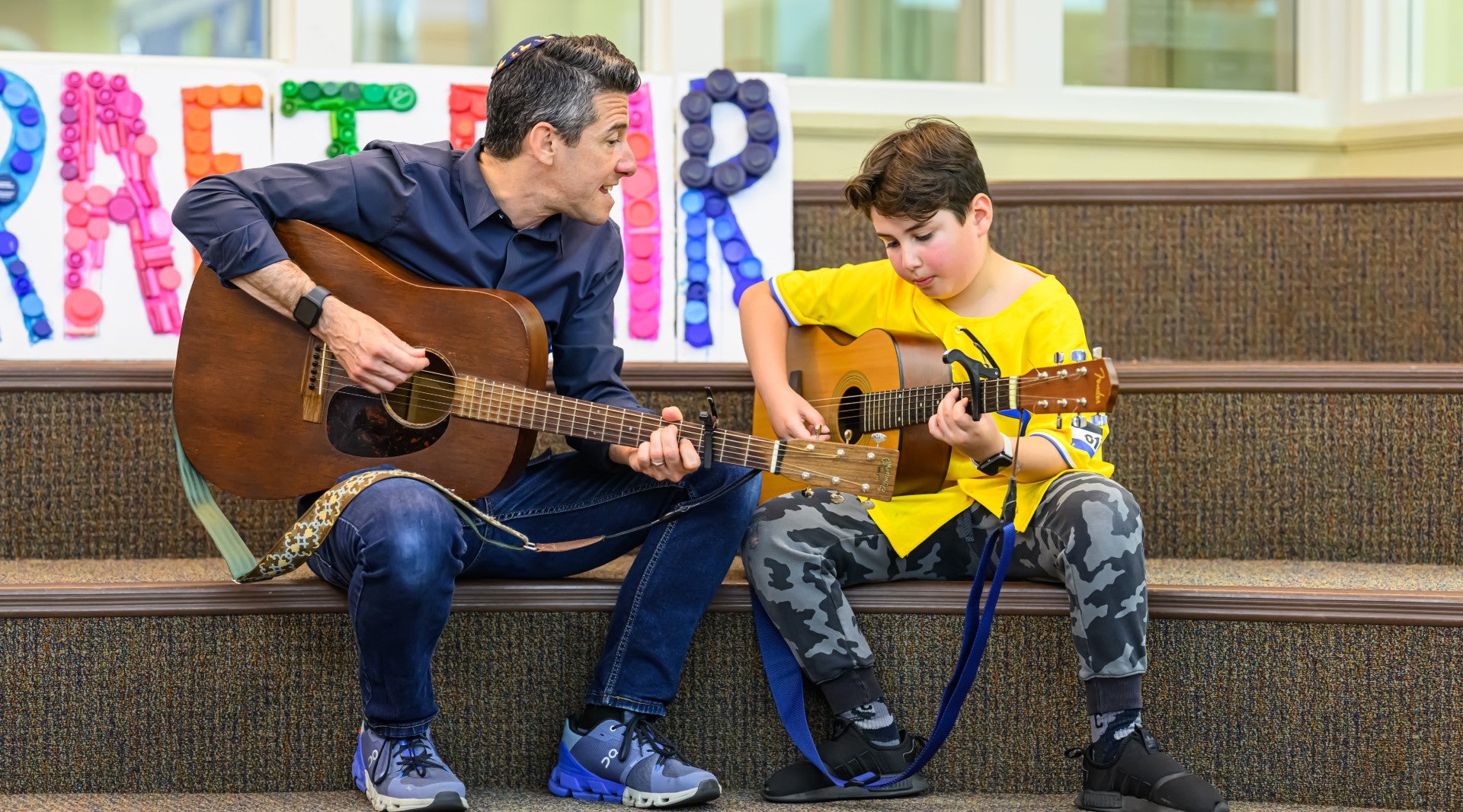Working at MTV is not typical training for a Jewish day school teacher. But Oren Kaunfer is no ordinary Jewish teacher.
The New England native had a successful career in television before deciding he wanted a more meaningful job. Kaunfer, the son of a prominent Conservative rabbi from Providence, Rhode Island, enjoyed the creativity of the entertainment business. But working on animation for shows like “Celebrity Death Match” just wasn’t checking his fulfillment box.
Friends suggested Kaunfer consider working at the Jewish Community Day School in Boston’s suburbs, where his daughter was about to enter kindergarten.
He attended a retreat for the pluralistic Jewish community school, warmed up to the idea and in 2012 applied for a job as madriach ruchani, or spiritual educator. School administrators liked his nontraditional career experience, combined with his day school background and musical talent.
“I went from producing promos earlier in the summer to being on lunch duty in September,” Kaunfer recalled.
Fast forward 13 years and Kaunfer plays a unique role at the K-8 school of approximately 170 students. Leading the Jewish life team, Kaunfer works with children of various ages and uses technology and creativity to teach Judaism and get students to think imaginatively about their spiritual life and practices.
In fourth-grade Bible study, Kaunfer has students use stop-motion animation to create films with their own midrashic interpretations of a Jewish text. He has co-taught a class where students develop a coding project to enhance the experience of Jewish prayer.
During COVID, Kaunfer used virtual reality headsets (delivered to students via contactless delivery) to facilitate joint prayer services while students were sequestered at home. An accomplished musician who plays guitar, mandolin and harmonica, Kaunfer re-imagined Kabbalat Shabbat on Zoom as a live TV variety show.
“Tefilah does not reside solely inside the prayerbook,” Kaunfer said.
Kaunfer’s career journey isn’t merely a feel-good story. It highlights one possible solution to a growing challenge faced by Jewish day schools across North America: how to fill a critical shortage of teachers, particularly Judaic studies teachers.
The dearth of teachers is a national challenge, and it’s even more pronounced at Jewish schools, where Judaic studies educators need additional qualifications such as Jewish knowledge and Hebrew proficiency. A recent report from the Jewish Education Innovation Challenge (JEIC) and Prizmah, two groups that support day schools, put the problem bluntly: “School and field leaders are struggling with recruiting, training and retaining talented educators.”
Sharon Freundel, managing director of JEIC, whose mission is to improve the quality of Jewish education in day schools across North America, said the COVID pandemic worsened the problem. Some veteran teachers retired to avoid remote teaching, while others did not feel comfortable returning to the classroom when in-school learning resumed.
“We need to figure out a variety of ways to attract more people to Jewish teaching–and to keep them–and we need to be operating on multiple tracks simultaneously,” Freundel said. “Identifying and motivating talented individuals currently working in other professions is one important piece of the puzzle.”
Prestige and pay are part of the challenge. Kaunfer is an example of someone whose career trajectory carries the potential to change perceptions related to the prestige of teaching in a Jewish school.
To enhance the pipeline of Jewish teachers, JEIC, together with Touro University, is launching a pilot program this month that aims to spark interest in day school teaching from a young age: among high school seniors in Jewish day schools. Students from four prominent day schools are taking a pedagogy class at Touro University for college credit and then student-teaching at their own schools, including the Ramaz School in New York City, North Shore Hebrew Academy on New York’s Long Island, Atlanta Jewish Academy, and Maimonides School in Brookline, Massachusetts.

An accomplished musician who plays guitar, mandolin and harmonica, Oren Kaunfer leads a Kabbalat Shabbat service at the Jewish Community Day School near Boston. (Courtesy of JCDS)
JEIC is also surveying communities across North America to see how it can improve benefits for Jewish day school teachers, including facilitating special discounting at such institutions as synagogues, Jewish camps and even kosher markets — similar to how US military service members are eligible for special discounts.
The Prizmah day school network, which includes about 315 Jewish day schools and yeshivas across North America, launched a pilot program in Boston using a recruiter to fill open Judaic studies positions at local Prizmah-affiliated schools. For this school year, the program will be expanded to Jewish schools in Chicago.
“There’s no silver bullet to solve the Jewish teacher pipeline issue,” said Rabbi Marc Wolf, Prizmah’s chief program and strategy officer.
JEIC and Prizmah are not alone in trying to recruit more teachers to the profession and support them with incentives. National and local foundations, Jewish federations and local Jewish institutions also are involved.
For its part, JEIC receives support from Touro and the Mayberg Foundation for its fellowship program. Prizmah is partnering with Boston’s federation, Combined Jewish Philanthropies, and the Beker Foundation, a Jewish family foundation in Boston. Chicago’s Jewish federation, the Jewish United Fund, and Associated Talmud Torahs of Chicago are helping with Prizmah’s efforts in the Windy City.
Investing in Jewish education is a communal must, Freundel said, because Jewish day schools are the single-most important institution for building a positive Jewish identity among the next generation of involved Jews.
Kaunfer says his career switch was an incredibly meaningful Jewish choice, and he speaks reverently about the growing pile of student thank-you notes he has received over the years. Jewish teaching also brought Kaunfer into the family business: His family helped establish a Jewish day school in Providence, his mother is an award-winning day school teacher, and his brother Elie Kaunfer is president and a founder of the Hadar Institute, which trains Jewish educators, rabbis and others.
Prayer is one of Kaunfer’s main areas of focus, and he approaches it in unconventional ways. He screens different versions of TV ads to demonstrate to students how people reciting the same text can send different messages. Using the childhood classic “Harold and the Purple Crayon,” he gets students talking about their own “prayer journeys.” He draws connections between the physical elements of Jewish prayer – bowing, kissing, standing on one’s toes – and improvisational dance.
The head of school at JCDS, Shira Deener, hailed Oren Kaunfer as a boon to the school’s Jewish culture and character.
“Oren is an extraordinary educator and an unbelievable musician,” Deener said, adding that his musical talents have helped transform the school’s weekly Friday Kabbalat Shabbat services.
Susie Tanchel, who hired Kaunfer when she was head of school at JCDS and now is vice president at Hebrew College in Boston, said people like Kaunfer are evidence that Jewish educators can be found in all kinds of unexpected places. Finding other motivated and talented professionals looking for meaning in their careers can be an important part of the solution of addressing the Jewish day school teacher shortage, she noted.
“Oren is a special guy, but there are other special people in the world,” Tanchel said. “He’s not the only one.”
JTA has documented Jewish history in real-time for over a century. Keep our journalism strong by joining us in supporting independent, award-winning reporting.
This article was sponsored by and produced in partnership with the Jewish Education Innovation Challenge, a bold initiative to radically improve the quality of Jewish education in day schools across North America. This article was produced by JTA’s native content team.
More from Jewish Education Innovation Challenge




